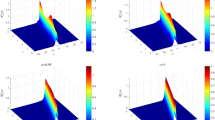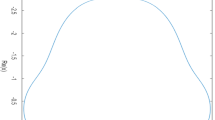Abstract
In this paper, we present a novel high-order structure-preserving numerical scheme for solving the damped nonlinear space fractional Schrödinger equation (DNSFSE) in two spatial dimensions. The main idea of constructing new algorithm consists of two parts. Firstly, we introduce an auxiliary exponential variable to transform the original DNSFSE into a modified one. The modified DNSFSE subjects to the conservation of mass and energy, which is crucial to develop structure-preserving numerical schemes. Secondly, we construct a high-order numerical differential formula to approximate the Riesz derivative in space, which contributes to a semi-discrete difference scheme for the modified DNSFSE. Combining the semi-discrete scheme with the variant Crank–Nicolson method in time, we can obtain the fully-discrete difference scheme for solving the modified DNSFSE. The advantage of the proposed scheme is that a fourth-order convergent accuracy can be achieved in space while maintaining the conservation of mass and energy. Subsequently, we conduct a detailed study on the boundedness, uniqueness, and convergence of solution for fully-discrete scheme. Furthermore, an improved efficient iterative algorithm is proposed for the fully-discrete scheme, which has the advantage of maintaining the same convergence order as the original difference scheme. Finally, extensive numerical results are reported to further verify the correctness of theoretical analysis and the effectiveness of the proposed numerical algorithm.
Access this article
We’re sorry, something doesn't seem to be working properly.
Please try refreshing the page. If that doesn't work, please contact support so we can address the problem.








Similar content being viewed by others
Data Availability
The authors confirm that the data supporting the findings of this study are available within the article.
References
Bao, W., Jaksch, D.: An explicit unconditionally stable numerical method for solving damped nonlinear Schrödinger equations with a focusing nonlinearity. SIAM J. Numer. Anal. 41(4), 1406–1426 (2004)
Ross, B.: Origins of fractional calculus and some applications. Int. J. Appl. Math. Comput. Sci. 1(1), 21–34 (1992)
Wu, Y.: Multiparticle quantum mechanics obeying fractional statistics. Phys. Rev. Lett. 53(2), 111–114 (1984)
Guo, X., Xu, M.: Some physical applications of fractional Schrödinger equation. J. Math. Phys. 47(8), 082104 (2006)
Kirkpatrick, K., Lenzmann, E., Staffilani, G.: On the continuum limit for discrete NLS with long-range lattice interactions. Commun. Math. Phys. 317(3), 563–591 (2013)
Liang, J., Song, S., Zhou, W., Fu, H.: Analysis of the damped nonlinear space-fractional Schrödinger equation. Appl. Math. Comput. 320, 495–511 (2018)
Celik, Ç., Duman, M.: Crank–Nicolson method for the fractional diffusion equation with the Riesz fractional derivative. J. Comput. Phys. 231(4), 1743–1750 (2012)
Fu, Y., Song, Y., Wang, Y.: Maximum-norm error analysis of a conservative scheme for the damped nonlinear fractional Schrödinger equation. Math. Comput. Simulat. 166, 206–223 (2019)
Li, C., Cai, M.: Theory and Numerical Approximations of Fractional Integrals and Derivatives. SIAM, Philadelphia (2019)
Lawson, J.: Generalized Runge–Kutta processes for stable systems with large Lipschitz constants. SIAM J. Numer. Anal. 4(3), 372–380 (2006)
Macías-Díaz, J.: A structure-preserving method for a class of nonlinear dissipative wave equations with Riesz space-fractional derivatives. J. Comput. Phys. 351(1), 40–58 (2017)
Ding, H., Li, C.: High-order numerical algorithms for Riesz derivatives via constructing new generating functions. J. Sci. Comput. 71, 759–784 (2017)
Tadjeran, C., Meerschaert, M.M.: A second-order accurate numerical method for the two-dimensional fractional diffusion equation. J. Comput. Phys. 220, 813–823 (2007)
Laub, A.J.: Matrix Analysis for Scientists and Engineers. SIAM, Philadelphia (2005)
Chan, R., Jin, X.: An Introduction to Iterative Toeplitz Solvers. SIAM, Philadelphia (2007)
Ji, C., Sun, Z.: A high-order compact finite difference scheme for the fractional sub-diffusion equation. J. Sci. Comput. 64, 959–985 (2015)
Browder, F.E.: Existence and uniqueness theorems for solutions of nonlinear boundary value problems. In: Finn, R. (ed.), Proceedings
Holte, J.M.: Discrete Gronwall Lemma and Applications, vol. 24, MAA-NCS Meeting at the University of North Dakota, pp. 1–7 (2009)
Wang, P., Huang, C.: An energy conservative difference scheme for the nonlinear fractional Schrödinger equations. J. Comput. Phys. 293, 238–251 (2015)
Wang, P., Huang, C.: An implicit midpoint difference scheme for the fractional Ginzburg–Landau equation. J. Comput. Phys. 312, 31–49 (2016)
Sun, Z., Zhao, D.: On the \(L^{\infty }\) convergence of a difference scheme for coupled nonlinear Schrödinger equations. Comput. Math. Appl. 59, 3286–3300 (2010)
Funding
This work was partially supported by the National Natural Science Foundation of China (Grant Nos. 11961057), the Science and technology project of Guangxi (Grant No. GuikeAD21220114), and the Natural Science Foundation of Gansu Province (Grant No. 22JR5RE197).
Author information
Authors and Affiliations
Corresponding author
Ethics declarations
Conflict of interest
The authors declare no Conflict of interest.
Additional information
Publisher's Note
Springer Nature remains neutral with regard to jurisdictional claims in published maps and institutional affiliations.
This work was partially supported by the National Natural Science Foundation of China (Grant No. 11961057), the Science and technology project of Guangxi (Grant No. GuikeAD21220114), and the Natural Science Foundation of Gansu Province (Grant No. 22JR5RE197).
Rights and permissions
Springer Nature or its licensor (e.g. a society or other partner) holds exclusive rights to this article under a publishing agreement with the author(s) or other rightsholder(s); author self-archiving of the accepted manuscript version of this article is solely governed by the terms of such publishing agreement and applicable law.
About this article
Cite this article
Ding, H., Qu, H. & Yi, Q. Construction and Analysis of Structure-Preserving Numerical Algorithm for Two-Dimensional Damped Nonlinear Space Fractional Schrödinger equation. J Sci Comput 99, 60 (2024). https://doi.org/10.1007/s10915-024-02521-5
Received:
Revised:
Accepted:
Published:
DOI: https://doi.org/10.1007/s10915-024-02521-5
Keywords
- Structure-preserving algorithm
- Numerical differential formula
- The damped nonlinear space fractional Schrödinger equations
- Iterative algorithm




